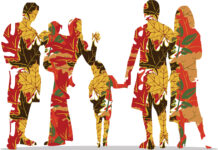Mad in America’s Parent Resources Q&A section is a safe place to ask questions and share concerns about children, families, and alternatives and have them answered on-site by one of our subject experts. Please email your questions to [email protected]. Your identity will be kept confidential. Questions may be edited for length and clarity. An archive of past Q & A’s can be found here.
Question:
What is the best way to support a child or family member who is withdrawing from psychiatric drugs?
Editor’s note: We passed this question to two different experts: Carina Håkansson, Ph.D., a therapist who has worked with families to come off such drugs, and Nicole Lamberson, who has lived experience in withdrawing from a medication cocktail. Both are board associates at the International Institute for Psychiatric Drug Withdrawal (IIPDW). Both also caution that each person’s experience of withdrawal is unique, and may shift throughout the withdrawal process.
 Reply from Carina Håkansson, Ph.D:
Reply from Carina Håkansson, Ph.D:
For many years I have worked with children and adults who want to withdraw from psychopharmaceutical drugs. Even though each case is different, my experiences have taught me that certain advice can be generalized to most people.
The Importance of a Support System
First of all, whether they are an adult or a child, it is of huge importance for the person coming off to be surrounded by people who are willing to participate in the process and to support them throughout. People who are willing to listen and to make sense of feelings and thoughts that might occur. Usually, these are family and friends, but also sometimes a professional.
This support is especially important when the person or their family has been told by a doctor that medication is absolutely required to treat their problems, possibly for life. We can all imagine the agonizing doubts that might occur when making a decision on whether to get off the medication. What if the doctor is right? What if I cannot function without drugs? What if I get worse than before? These and similar thoughts are very common, and it is of utmost importance to make space for these and other questions to be asked.
Eliza’s Story
For example, I was contacted by a father who wanted to support his 23-year-old daughter’s decision to withdraw from antidepressants. I’ll call her Eliza. Eliza had been on antidepressants for four years. I invited her together with her family to my therapy room. I invited the whole family to this first meeting because Eliza´s withdrawal would affect everyone.
A week later Eliza, her father, mother, older sister, and I met. First, I talked with her about her experiences with the drugs and what led her to choose to withdraw. Then I asked each family member to consider in what ways they could support Eliza. I also ask if someone was missing today who might be important to her. She said that her best friend could be supportive, but she did not know if she wanted to “bother” her. I suggested we wait and see; maybe Eliza would ask her to participate at another time.
We also talked about how the family felt about Eliza’s decision to withdraw. Her mother was ambivalent. She observed that Eliza seemed less sad than she was four years ago. I then asked Eliza how her mother´s reaction affected her. Did she agree— had she been less sad since she started to take the drugs? Eliza did not agree, saying that life was different now and it was for this reason she was less sad. “And,” she claimed, “I want to see who I am without drugs. And how I manage life.”
I turned to the mother and asked what she herself needed to feel safe in the face of this change. Did she have any questions we might talk about? Did she have any specific questions to ask her daughter?
It turned out that Eliza’s mother had questions about withdrawal in general, and then we talked about fear, since that is what seemed to be coming up in our discussion the most. I asked the mother and then the others present what they were most afraid of. What is the worst that might happen? What did each of them need to be able to feel safe enough?
The question raised feelings and thoughts about a return to a past in which Eliza struggled, but also concerns about the future. I reminded the family that we would meet again and that we did not have to rush this process. Withdrawal takes time.
Before we said goodbye, I tried to focus on hope. I asked Eliza: What does life look like in a year or two’s time? What do you do then? How does it feel to be you then? What about your relationship with your family?
I also suggested a structure for the work we would do together, including how often we would meet and who would participate. Perhaps Eliza wanted to come by herself, with the family joining in later on a regular basis, or perhaps the family preferred to come together every time. In the end, they decided that Eliza would meet with me solo once a week. Every other month, her family came in and participated as well.
In the beginning and with her permission, I spoke to her parents by phone as needed, and let Eliza know she could contact me for anything urgent. She did this once, at a time when the emotional and physical discomfort of withdrawal felt especially difficult. This process continued for one year, and then we said goodbye to each other. Eliza told me and her family (who had been very supportive) that she felt good enough to deal with life from now on without professional support. I told her, as I usually do, that she was welcome to contact me if she ever needed to. She never did.
Preparing for Shared Work
As I mentioned, at the beginning of this shared work, I typically pay attention to addressing fears, since so many people considering withdrawal experience such anxieties. There is fear of what will happen in terms of physical and emotional reactions to tapering off the medication, fear of never being able to get off of it, and many more.
I try to prepare people for the process by telling them about the physical symptoms one often has during withdrawal: tiredness, body aches, flashes of light in the eyes, dizziness, and embodied feelings of sadness, anger, and anxiety. It is also pretty common for people to express a feeling of having had their “real experiences” stolen during the years they were on medication, and to realize how the medication itself created suffering and side effects.
I also suggest to the person withdrawing that they reduce their dose very slowly. This is not only because the body needs time to adapt to the change, but also due to the emotional and psychological reactions that can occur. It often takes a while to get to know who you are without drugs, and how you respond to different situations. Therefore, patience is needed.
It sometimes happens that I see people for a couple of years as they go through the withdrawal process, but at other times, we may meet for less than half a year. Some people just want a consultation for an hour or two. In that situation, I suggest that the young person and their parents find some regular support, either a close friend or a professional helper who has lived experience in withdrawing and is living proof that it is possible to get off these drugs. Hearing others’ experiences is crucial, for it creates hope.
Listening and Adjusting
Since there is still very little formal research on how best to withdraw, it is therefore vital to listen to the person undergoing the process. Ask them what kind of support they need from you. And ask yourself what you need from others to be able to support your child in this way. It is also important to consider what is best for both the family unit and each individual family member. There are many factors to consider: personality, the nature and quality of one’s relationships and personal networks (especially the presence or absence of trust), cultural context, the overall health of the person withdrawing, resources (financial and otherwise), and so on.
From my experience, the child, no matter their age, usually needs a safe space for the expression and acceptance of their feelings and thoughts. The withdrawal period can be a tough time, not just for the young person but also for their parents. More often than not, your child will express how upset, disappointed, or sad they are that you once upon a time agreed to give them medication. If you find it hard to deal with such resentment or guilt, it would be good to talk about it with a friend or a therapist instead of arguing with the child, or even worse denying what happened.
As in Eliza’s case, sometimes family support alone might not be enough. If it is financially possible, I would suggest that the child get additional support from a therapist. When a person has used psychiatric drugs for a long time, and especially if they were very young when the medication was prescribed, they typically face an existential crisis during the withdrawal process. Questions about identity, but also feelings of loss might appear. Such challenges are sometimes better discussed with someone outside the family since family members are involved in the support circle, and their own feelings and thoughts might hinder the child from expressing themselves.
The most important thing to remember is that for many people withdrawal is hard work and therefore it is important to be surrounded by caring others who can help them ride out the ups and downs of the process, especially if the person is still a child.
 Reply from Nicole Lamberson, P.A.
Reply from Nicole Lamberson, P.A.
I had been an adult with a professional career—around 30, to be exact—when I became disabled by my withdrawal from the medications a psychiatrist so casually doled out for years. Yet during the worst of my suffering, I was reduced to a childlike state, rendered so ill I could no longer work, and was forced to move home. At my worst, I could barely leave the house, drive, or shop for groceries for myself.
Without mincing words: I would not be alive today were it not for my father. Having family support is an integral part of healing from psychiatric drugs, especially for the more severe cases, so I consider myself incredibly lucky. Together, my dad and I have navigated my psychiatric drug injury the best we could, but we certainly didn’t do everything right from the beginning. There were countless mistakes made, and no shortage of frustration, screaming, crying, and hurtful words.
Being the supporter (or the sufferer, for that matter) doesn’t come with a manual. And often there’s no warning of what is to come—withdrawal just barrels into your lives, disrupting everything in its path, and everyone has to jump quickly into action if it is to be survived. Having navigated this challenging situation myself, alongside my dad, for the past 12 years, I can offer the following tips.
-
Educate yourself:
First and foremost, arm yourself with knowledge about both psychiatric medications and their withdrawal syndromes, including common symptoms. There are a plethora of:
- books
- films such as the documentaries “Medicating Normal,” “As Prescribed,” and “The Benzodiazepine Medical Disaster,” among others.
- videos (start with the YouTube pages of Mad in America, Medicating Normal, the Council for Evidence-Based Psychiatry, or the Benzodiazepine Information Coalition; YouTube houses others)
- websites
- support forums (like Surviving Antidepressants and BenzoBuddies) and groups (search Facebook for online groups; there are even in-person groups in some locations like the UK and Australia)
- other resources and information.
Your child may also give or send you things—if they do, read or watch them! (Note: be mindful that there is much inaccurate information out there too, some even co-signed by doctors, psychiatrists, and government agencies.)
- Believe your child: Withdrawal is common and very real. Unfortunately, many people, including doctors, are uneducated about these issues and will deny they exist. Your child needs you to believe that what they are experiencing is real and that the symptoms are as distressing as they report.
- Appreciate the seriousness of withdrawal: Withdrawal can cause chronic illness and in severe cases has resulted in psychosis, seizures, and suicides.
- Provide practical support: People in withdrawal need their basic needs met (food, money, shelter, healthcare, peace, quiet, privacy, etc.). Other practical support might include grocery shopping, cleaning, childcare, or a ride to the doctor.
- Advocate for them: This might look like accompanying them to doctor visits (armed with information to educate a prescriber about the need for ongoing refills for a slow taper), assisting with a disability application, etc.
- Respect their wishes: Withdrawal is more of an art than a science. Because some things work for some and prove disastrous for others, there will be difficult decisions to make. On top of that, (often uninformed) doctors may suggest things like adding a new medication, speeding up the taper, etc. Your child may reject this advice. You can aid your child in making decisions (help them research, weigh the pros and cons, etc.), but, ultimately, it’s best to respect their wishes if they are different from yours.
- Communicate and listen: Ask what they need from you or how you can help, and listen to their answers (which may change over time). Also, communicate your own availability, so that there are no surprises and they can have reasonable expectations of you.
- Check in often/be available: It often helps to know that someone reliable is available to help if needed. Some people in withdrawal wish to be alone, but you can still let them know you’re there without violating their space. Others want company, in which case it will help to be physically present when you can.
- Reassure and offer hope: It helps to hear that this is a temporary state that will get better with time. Sometimes, this message will need to be repeated over and over again, especially during times of heightened distress. You can also offer anecdotes or read success stories.
- Stay calm: This is easier said than done when your child is suffering, especially if they experience some of the more scary and bizarre symptoms of withdrawal such as paranoia, terror, dissociation, and panic. If you are anxious, your child will feed off that. Try to remain calm and grounded in their presence.
- Be patient with them (and with yourself!): Withdrawal can be a long process— issues (such as tolerance withdrawal and interdose withdrawal) can begin even before dose reductions are made and persist long after the drug is out of the body. It sometimes takes years. It’s best to release expectations and timelines. Let your child know they are not a burden, and that you will be there no matter how long it takes for them to heal. Encourage others around you (family, friends) to be patient too. Lastly, be patient with yourself—supporting someone with a chronic illness can be incredibly challenging.
- Stay in the present: Don’t get too far ahead of yourself. Take things one day at a time. Some of the things you worry about or fear may never happen.
- Be gentle, flexible, and forgiving: Withdrawal symptoms can drastically impede one’s ability to participate in life. Be flexible. Your child may need to reschedule or cancel often. Withdrawal can also cause rage, mood swings, and irritability. My dad used to say things to me like, “You’re still in there!” This let me know that he knew my behaviors were from the drugs and that he believed I’d eventually be myself again. Withdrawal can also cause neuro-emotions (e.g., neuro-shame, neuro-guilt). Be gentle with them, and encourage them to be gentle with themselves. As the parent and supporter, you will also make mistakes—forgive yourself too.
- Have empathy: Without enduring psychiatric drug withdrawal yourself, you will never fully understand it, but you can empathize. This video from Brené Brown is informative. Also, take heed of her advice: “In order to empathize with someone’s experience, you must be willing to believe them as they see it, and not how you imagine their experience to be.”
- Employ the Ring Theory: Your child is in the center ring. The people closest to them (e.g., you, the parent) fit around the center ring. Others further out from the crisis fill the outer rings. Bring comfort in and dump your own stuff out.
- Get support and take care of yourself, too: People in withdrawal can be draining and exhausting. You will need breaks and support. There are online groups for families (e.g., Family Circle at Inner Compass Exchange). Also, don’t be afraid to set boundaries (“I am not able to do that today, but I can make time tomorrow”) and ask for help from others if you need it. Burnout is real. You can’t help others if you’re not healthy yourself (there is a reason airlines instruct parents to put their oxygen masks on first).
- Love them: Tell them you love them. Often. Provide loving physical touch, like hugs (if that is comforting and they’re open to receiving). Offer loving gestures (make their favorite meal, leave an encouraging card).
What is as important, if not more, than what you can do to support your child is what not to do! Below are some things to avoid:
- Regressing into the “parent-child” dynamic: Avoid infantilizing or parenting them. Even if impaired from withdrawal, an adult child is still an adult; a teenager is an adolescent and not a toddler. Understand that it is already incredibly demoralizing to lose your autonomy, to have to move home, rely on others for your basic needs, and/or lose financial independence.
- Excessive stimulation/stress/pressure: Psychiatric drug withdrawal can make one feel overexposed, like a snail without a shell. The natural calming mechanism of the body that non-withdrawal people enjoy is often malfunctioning during withdrawal. Noises can seem loud and intolerable, crowds too stimulating, and multitasking overwhelming. Too much stress or pressure can tip someone over the edge into a meltdown or crisis.
- Judging/shaming/blaming: When someone is suffering, the last thing they need is shame or blame in the form of comments like, “Why did you take drugs to cope? You should’ve known better!” Trust me, they are already beating themselves up enough as is. Understand that most people in withdrawal were not provided adequate informed consent about the potential risks and harms of the drugs. Hindsight is 20/20, but we can’t go back in time, so it’s best to accept what is and work on a plan to move forward.
- Wrongly labeling them an “addict”: The presence of withdrawal with attempts at dose reduction does not indicate addiction/substance use disorder (SUD) or that your child is abusing their medication. All psychiatric drugs have the potential to cause physical dependence and subsequent withdrawal. This happens simply by way of neuroadaptation (physiological changes from chronic exposure to the drugs).
- Threatening hospitalization: Being locked up against one’s will is an intense fear held by many people experiencing withdrawal. It is a legitimate worry that a hospital will disbelieve that your child is in withdrawal or, worse, “cold-turkey” their medications or add or force more medications that could further harm them. Using this as a threat is cruel.
- Suggesting that this is “all in their head” or that they “need to pull it together,” “try harder,” or “get off the internet”: Sadly, these are all comments commonly reported by withdrawal sufferers. “Tough love” or a “pull yourself up by the bootstraps” mentality will not work to reverse neuroadaptation from psychiatric drugs. Believe me, your child wants this to end more than anyone, but cannot just “snap out of it.” Regarding the internet, online support groups are often the only place where information and support from others in the same boat can be found.
- Minimizing what they are going through: Comments like “other people have it worse” should be avoided. Even if true, that doesn’t negate your child’s very real suffering.
- Ignoring their suffering: It is important that you validate their suffering. Please do not act like it is not happening.
- Toxic positivity: Asking them to hide their true emotions, minimizing their experience with “feel good” statements, shaming them for exhibiting anything other than positivity, or trying to cheer them up excessively are all examples. Anger, frustration, grief, and crying are all normal in withdrawal; making space for them is integral to healing.
- Acting like they longer exist: Because withdrawal can persist for so long, people sometimes stop including the sufferer. It is better to continue to extend invitations (with an easy out: “No pressure, I know you’re sick, but I want you to know you’re welcome when you’re ready!”) so they know they’re still missed and wanted.
I cannot stress enough the importance of a support system in withdrawal. In providing the right support for your child, you will have an immeasurable influence on the outcome of their withdrawal experience. The end result can also be a much closer and more deeply connected relationship than existed before. This was the case for my father and me, and I am so grateful for that.
***

Carina Håkansson, Ph.D., is a licensed psychotherapist. The author of three books and several articles, she is the founder of Family Care Foundation, where she was managing director until 2015. Carina is the co-founder of the International Institute for Psychiatric Drug Withdrawal (IIPDW). Today she runs a small practice in Gothenburg, Sweden, which includes psychotherapy, training, supervision, and writing.

Nicole Lamberson is a Physician Assistant with lived experience of prescribed psychiatric drug polypharmacy and protracted withdrawal. Some of her work around these issues includes: co-founder of The Withdrawal Project; Team Member at Inner Compass initiative; marketing, distribution and outreach for the documentary “Medicating Normal”; Medical Advisory Board Member at Benzodiazepine Information Coalition; and Associate at the International Institute for Psychiatric Drug Withdrawal.














